Accutane for Acne Treatment
Find out if Accutane is the right option for your acne treatment
Acne is one of the most common skin conditions, affecting nearly 50 million people in the United States. It can be unsightly and painful, often making individuals feel self-conscious about their appearance. Additionally, scars from acne breakouts can be more difficult and costly to treat than the acne itself. Fortunately, Accutane, the brand name for Isotretinoin, offers a permanent solution for severe acne and persistent breakouts. FDA-approved, safe, and effective, Accutane treats all types of acne. Dr. Michele Green in NYC was one of the first dermatologists to prescribe Accutane to her patients, aiming to eliminate all forms of stubborn acne permanently. She has been prescribing it to her Upper East Side Manhattan patients for over twenty years.
Accutane works by reducing oil production, shrinking the size of sebaceous glands, increasing skin cell turnover, and inhibiting the growth of bacteria that cause acne on the skin’s surface. It is an oral form of vitamin A, and treatment typically lasts around twenty weeks. During this time, patients need to visit Dr. Green monthly for blood work, progress check-ins, dosage adjustments, and to prevent side effects. After completing the course, 95% of patients experience no new breakouts or pimples. If you’re interested in clearing your acne and achieving clear, smooth, healthy skin, Dr. Green is here to help.
Dr. Michele Green is an internationally renowned, board-certified dermatologist who provides innovative treatments for acne and scars to some of the world’s most discerning individuals. With over 25 years of dermatology experience, she believes Accutane is essential for treating acne and preventing scarring. Dr. Green takes the time to understand her patients’ unique concerns, needs, and goals, delivering remarkable, long-lasting results. She is regularly recognized as one of New York’s top dermatologists by Castle Connolly, New York Magazine, and Super Doctors for her dedication and expertise. When you consult with Dr. Green, she will work with you to develop a personalized acne treatment plan tailored to your skin type, tone, and condition, resulting in clear, smooth, healthy, and beautiful skin.
What is Accutane?
Isotretinoin, commonly known as Accutane, is a powerful oral medication used to treat moderate to severe acne vulgaris that has not responded to other treatments such as topical and oral antibiotics, topical tretinoin, or over-the-counter products like salicylic acid, glycolic acid, and benzoyl peroxide. In the past, Accutane was considered a last-resort option when all other treatments failed. Today, it is often prescribed for all types and severities of acne, helping to prevent future breakouts and scarring. Accutane is a vitamin A derivative retinoid that effectively fights various forms of acne, including cysts, nodules, pustules, pimples, whiteheads, and blackheads. Other brand names for Isotretinoin include Absorica, Amnesteem, Claravis, Myorisan, and Zenatane, which can only be obtained with a prescription from a board-certified dermatologist.
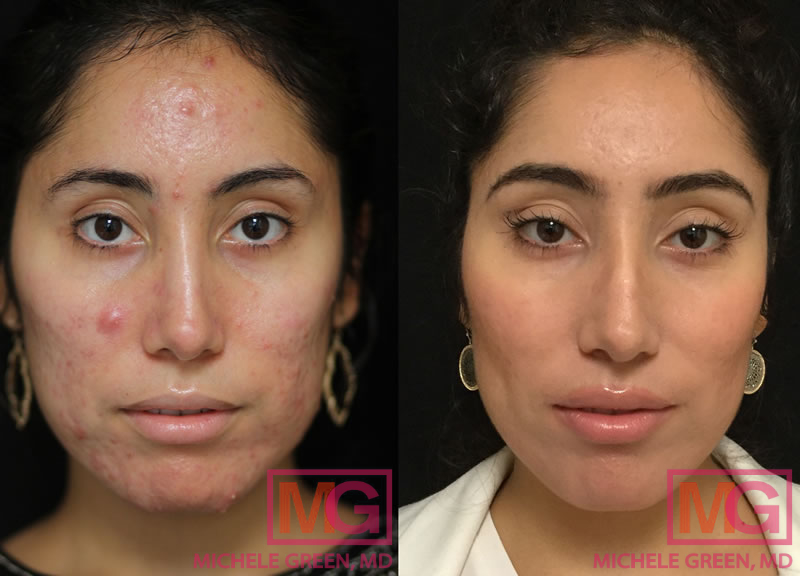
23 year old woman treated for acne with Accutane – 3 months
How does Accutane stop acne?
The exact mechanism of Accutane is not fully understood. However, it is believed that its action triggers apoptosis, or programmed cell death, in the sebaceous glands, reduces inflammation, and kills bacteria inside the follicle. This process promotes skin healing and helps prevent the formation of new acne lesions. Besides inducing apoptosis, Accutane also decreases sebum production and has antimicrobial effects against certain acne-causing bacteria. Additionally, it increases skin cell turnover, making it less likely for dead skin cells to form comedones like blackheads and whiteheads. These combined mechanisms work together to provide a more lasting “cure” for all kinds of acne, including severe cystic acne.
Accutane is taken orally based on your weight, usually at a dose of 1-2 mg per kg per day. Since it is processed in the liver, regular monthly visits are necessary to monitor blood work and ensure liver enzymes stay normal during treatment. Additionally, lifestyle changes such as avoiding alcohol or vitamin A-containing supplements will be discussed to keep your treatment safe and effective. Many patients report that their acne was permanently cleared after one course of Accutane, or at least has remained clear for many years.
What is the iPLEDGE Program?
The iPLEDGE Program started in 2005 and covers all FDA-approved Isotretinoin. The Food and Drug Administration oversees it as part of a U.S. government initiative. iPLEDGE is a centralized system that helps doctors, pharmacists, and patients manage medications to prevent birth defects and ensure proper monitoring and prescribing of Isotretinoin.
Women of childbearing age who participate in the iPLEDGE program to take Isotretinoin for stubborn cystic acne must have two documented negative pregnancy tests before the medication can be prescribed. They also need to sign an agreement to use two forms of contraception or abstain from sexual activity while taking Isotretinoin. Birth control pills are considered an excellent method of pregnancy prevention during Accutane treatment. The combination birth control pill is recommended over the mini-pill because it contains both estrogen and progesterone. All women must have a negative pregnancy blood test each month to continue using Isotretinoin.
How bad should your acne be to take Accutane?
Accutane is highly effective in treating all types of acne and is the most successful choice for severe cases, including cystic and nodular acne. Initially used only for severe cystic and nodular acne, its application has expanded to address various stubborn forms of acne that do not respond well to other oral or topical treatments. Accutane targets multiple causes of acne, such as clogged pores, acne-causing bacteria, excess oil production, and skin inflammation. These qualities make Accutane a powerful treatment for all acne types.
Can Accutane fix hormonal acne?
Accutane can be a highly effective treatment for hormonal acne, especially when other options haven’t worked. It works by reducing sebum production, which is a key factor in causing acne. Hormonal acne is often triggered by fluctuations and imbalances in hormone levels, particularly androgens like testosterone. These hormonal changes stimulate the skin’s sebaceous glands, leading to increased sebum production, an oily substance produced by these glands. Accutane directly decreases sebum output, helping to prevent clogged pores and breakouts.
Does Accutane help fungal acne?
Accutane can help treat acne caused by fungi—fungal acne results from an overgrowth of yeast-like fungi on the skin. Accutane is an oral retinoid medication that can reduce inflammation and oil production, which are factors that contribute to fungal acne. By lowering oil levels and inflammation, Accutane helps create an environment less favorable for fungal growth, clearing existing fungal acne lesions and preventing new ones from developing.
Accutane Treatment Process:
The first step in the treatment process involves scheduling a consultation with Dr. Michele Green at her private office in New York City. During this appointment, you’ll discuss your current skin condition and determine if Accutane is the right medication for you. A comprehensive review of your medical history will cover any hormonal changes or family history of acne or other skin conditions. It’s also important to discuss any history of diabetes, obesity, mental health issues, liver disease, bone loss conditions like osteoporosis, and eating disorders such as anorexia. Dr. Green will order a thorough metabolic profile and other blood tests, including hormonal tests, to check for liver problems, hormonal irregularities, or anemia.
Patients must enroll in the iPLEDGE program to get their medication directly from the pharmacy. Women need to have two negative pregnancy tests before starting treatment. Additionally, women should use two forms of birth control (such as birth control pills and male latex condoms) or avoid sexual intercourse during treatment. It is also advised that patients stop taking herbal supplements like St. John’s Wort while on Accutane, as these may reduce the effectiveness of hormonal contraceptives.
Accutane dosages are based on weight and typically range from 1 to 2 milligrams per kilogram per day. Depending on the dose, Accutane should be taken once or twice daily with food to ensure optimal absorption. During treatment, regular monthly visits and blood tests are necessary to monitor for side effects, including liver enzyme levels, white blood cell (WBC) counts, and red blood cell (RBC) counts. Women must also have monthly negative pregnancy tests via blood testing. Since Accutane is regulated through the government’s iPLEDGE program, all blood test results and birth control methods must be documented and updated monthly in the system before the prescription can be issued. The total course of Accutane usually lasts about twenty weeks, but can vary from patient to patient. Many patients notice an improvement within the first month, while a small percentage may experience an increase in acne breakouts during this time, known as the “purging” phase. This is a temporary issue expected to improve as treatment progresses. Over 95% of patients respond well to Accutane and experience no further breakouts after completing their five-month course.
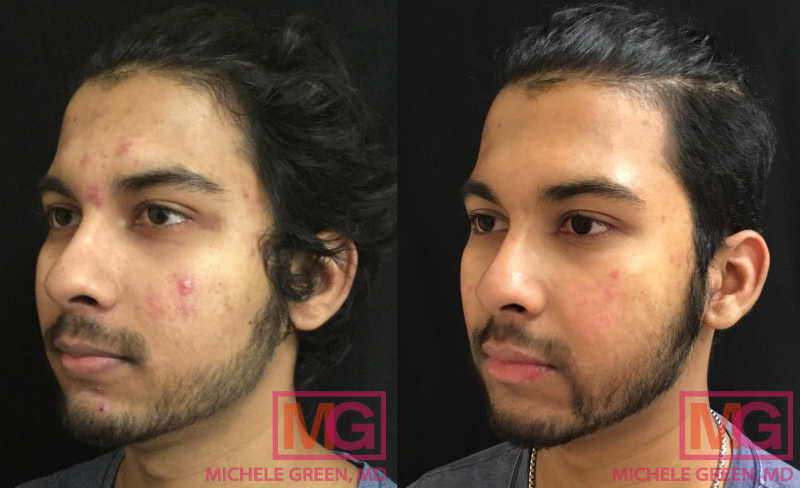
Male treated for acne with Accutane
What are the common side effects of isotretinoin treatment?
Side effects from isotretinoin treatment vary between individuals. As Accutane decreases sebum production, which can lead to dryness, some of the most common side effects include:
- Dry lips and mouth
- Dry skin
- Nosebleeds resulting from dry nasal passages
- Dry eyes
Dr. Green will recommend using moisturizers or cortisone creams if the dry skin is severe. Lip dryness, a common side effect of Isotretinoin, can also be managed with emollients. Some patients may experience dry eyes when wearing contact lenses, and daily saline eye drops can help alleviate dry eyes. While taking Accutane, your skin will be very sensitive to the sun. Therefore, it is important to limit sun exposure, avoid tanning beds, and use proper sun protection to prevent sunburns.
Other common side effects from Accutane usage include:
- Joint pain
- Muscle problems, such as muscle pain or aches
- Temporary hair thinning
- Skin irritation
- Headache
Typically, the severity of side effects is associated with dosage, as individuals on a lower dosage may experience fewer side effects than those on a higher dosage.
What are the other side effects of Accutane for acne?
Some individuals have reported serious digestive and intestinal side effects when taking Accutane. Researchers have yet to find a link between Accutane and gastrointestinal side effects. However, it is always important to let your provider know if you are experiencing any gastrointestinal symptoms, including but not limited to:
- Liver problems, such as hepatitis
- Crohn’s disease
- Inflammatory bowel disease
- Ulcerative colitis
- Pancreatitis
- Jaundice (yellowing of the eyes or skin)
- Increased cholesterol, triglyceride, or blood sugar levels
- Rectal bleeding
- Diarrhea
Individuals have reported mental health side effects of Accutane usage. Although there has been no causal relationship determined between Accutane usage and mental health problems, it is important to consult with your doctor and stop taking Accutane immediately if you experience symptoms such as:
- Depression
- Mood changes
- Increased anxiety
- Suicidal thoughts
- Psychosis
Rare but serious side effects can also occur, including:
- Benign cranial hypertension (increased pressure in the brain)
- Blurred vision
- Decreased night vision
- Nausea
- Seizures
- Stroke
Bloodwork will be taken at each Accutane visit with Dr. Green to monitor liver function and blood sugar levels. Any side effects or allergic reactions, such as hives, should be reported promptly to Dr. Green for optimal management and treatment.
Severe birth defects can occur with Accutane usage during pregnancy, including:
- Hearing and visual impairment
- Missing or malformed earlobes
- Brain function abnormalities
- Facial dysmorphisms, such as small or missing eyes or a cleft palate
- Congenital heart defects
- Hydrocephalus (fluid and pressure buildup on the brain)
Any patient who can become pregnant must use two effective forms of birth control during treatment or commit to abstinence. A pregnancy test will be performed one month before starting treatment and at each subsequent Accutane visit. Patients must also avoid becoming pregnant for at least one month after stopping Accutane. Additionally, it is also advised not to breastfeed while taking Accutane, as it may pass into the breast milk.
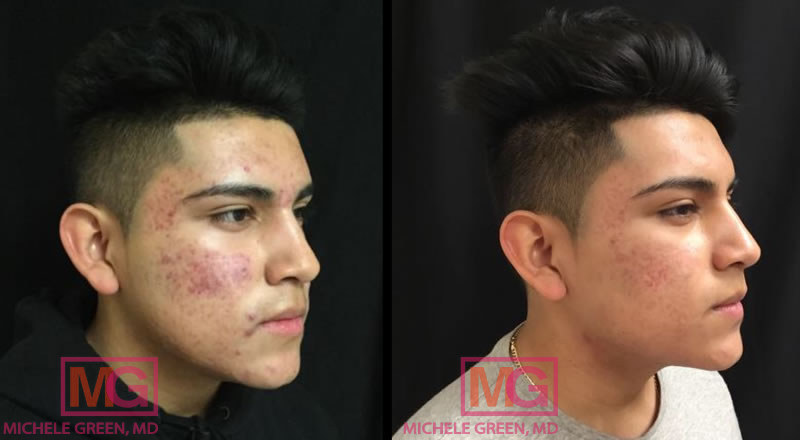
17 year old treated for acne with Accutane
Are there known drug interactions with Accutane treatment?
Tetracycline antibiotics, such as Doxycycline and Minocycline, should not be taken while on Isotretinoin (Accutane) because they can increase the risk of benign intracranial hypertension. Symptoms of this condition include headaches behind the eyes, ringing in the ears, and vision problems. It is also important to stop taking phenytoin (Dilantin) while on Isotretinoin, as it can lead to bone loss and weakening. Carefully read and follow your Accutane medication guide for safety. If you have any questions about drug interactions with Isotretinoin, contact a board-certified dermatologist like Dr. Green in NYC.
What skincare should be used while taking Accutane?
Photosensitivity and dryness are common side effects of Accutane. It’s essential to use a rich, non-comedogenic moisturizer and a broad-spectrum sunscreen with at least SPF 50 while taking Accutane. These skincare products help nourish the skin, restore moisture, and protect against the sun’s harmful UV rays. While some well-known acne-fighting ingredients include retinoids, alpha-hydroxy acids, benzoyl peroxide, and salicylic acid, these can be too irritating for those on Accutane. Instead, individuals should follow a gentle, hydrating skincare routine with non-comedogenic products.
Using a gentle cleanser twice daily without vigorous scrubbing is generally recommended for Accutane users. Aggressive scrubbing or using products with active ingredients can worsen skin irritation, increase inflammation, and cause excessive peeling. Dr. Green has carefully developed the Gentle Cleanser from her MGSKINLABs, Inc. line to help patients maintain skin moisture while effectively cleansing. This cleanser is ideal for daily use and gentle enough for very dry and sensitive skin, which many might experience while taking Accutane.
Using a lightweight, oil-free, non-comedogenic moisturizer is essential because Accutane decreases sebum production. Keeping the skin hydrated is always important for skin health, especially when using a medication like Accutane. While excess sebum often causes acne, the reduced sebum during Accutane treatment can lead to dry, flaky, and cracked skin. Dr. Green’s Ultimately Sheer Hydrating Lotion is specifically formulated for sensitive and acne-prone skin, making it a great choice for patients on Accutane. The lotion is enriched with aloe and rose water, leaving the skin feeling soft and hydrated without any greasy residue.
Using a broad-spectrum SPF while on Accutane is a crucial part of your skincare routine. Accutane increases the skin’s sensitivity to sunlight, which can worsen the appearance of acne, cause more breakouts, and result in dark marks where acne lesions have been. Dr. Green recommends a two-step sunscreen approach, starting with a chemical sunscreen and finishing with a physical sunscreen. The chemical sunscreen should contain active ingredients like avobenzone, octinoxate, oxybenzone, and homosalate, and it must be fully absorbed into the skin first. Next, apply a physical sunscreen containing Titanium Dioxide or Zinc Oxide, which stays on the surface of the skin and acts as a barrier against the sun’s rays. Dr. Green’s SPF 50 Advanced Formula Broad Spectrum sunscreen is an excellent choice for sun protection, especially when used with Accutane. To ensure effective coverage, apply the sunscreen 15 minutes before sun exposure and reapply after swimming, excessive sweating, or towel drying. Additionally, reapply sunscreen every 1.5 to 2 hours for optimal protection when spending time in direct sunlight.
What procedures should you avoid on Accutane?
Accutane is a photosensitizing retinoid medication, so it is best to use a high SPF daily and avoid tanning beds and any excessive sun exposure. Since Accutane delays wound healing, cosmetic procedures such as dermabrasion, skin resurfacing or exfoliation, plastic surgery, chemical peels, laser treatment for acne scars or tattoo removal, laser hair removal, or waxing should all be avoided. Botox and dermal filler injections, like those with Restylane, Sculptra, or Juvederm, are considered safe for patients while they are on Accutane. Patients must wait at least six months after finishing Accutane therapy before undergoing treatments with resurfacing or radiofrequency lasers (RF), such as Vivace and eMatrix laser, as the effects of Accutane can stay in the system after completing the medication. For more aggressive lasers, like a CO2 laser or Fraxel laser, it is recommended to wait at least one year after finishing Accutane.
When does acne get better on Accutane?
Most patients notice improvements in their acne within one to two months of starting treatment. During your Accutane course, you’ll likely see a decrease in oil production and fewer acne breakouts or pimples. Usually, a twenty-week course of Accutane is necessary to permanently eliminate acne breakouts.
Does Accutane make acne worse at first?
No! Many believe that Accutane initially worsens acne, but in reality, it works by reducing oil production and shrinking oil glands, which happens within a few weeks of starting treatment. By shrinking these oil glands and reducing facial oil, your pores are less likely to get clogged and inflamed, eliminating existing acne and preventing new breakouts. During treatment, acne begins to improve as the medication takes effect, and the skin will visibly clear. An experienced dermatologist, like Dr. Green, will carefully monitor you for potential side effects and adjust the dosage as needed to prevent serious health issues and help you achieve clear skin.
How long do you take Accutane for acne?
Typically, a course of Accutane lasts about five months or 20 weeks, but it can range from four to six months depending on the individual’s progress. By the end of the 20-week treatment, 95% of patients report that their acne is fully cleared. However, some may require a longer course of Accutane to achieve the best results. After finishing the initial five-month treatment, Dr. Green will assess your progress and advise whether to continue treatment for a further period. In less than 5% of cases where acne returns after taking Accutane, a second course might be needed, usually lasting another four to six months. If a second course is necessary, it cannot start until at least two months after the first.
Some healthcare professionals might prescribe a low-dose, low-frequency regimen for Accutane as an “off-label” treatment, which means the FDA has not reviewed the risks associated with taking Accutane at a low dose over a long period. As a result, long-term, low-dose use of Isotretinoin is generally not recommended. Additionally, it is vital to use the correct dosage during treatment. The recommended dosage for Accutane is 1-2 milligrams per kilogram of body weight daily. People who do not take a sufficiently high dose of Accutane may experience breakouts after finishing their treatment. It is important to consult a board-certified dermatologist, such as Dr. Green, to ensure you are on the proper dosage for effective and lasting acne treatment.
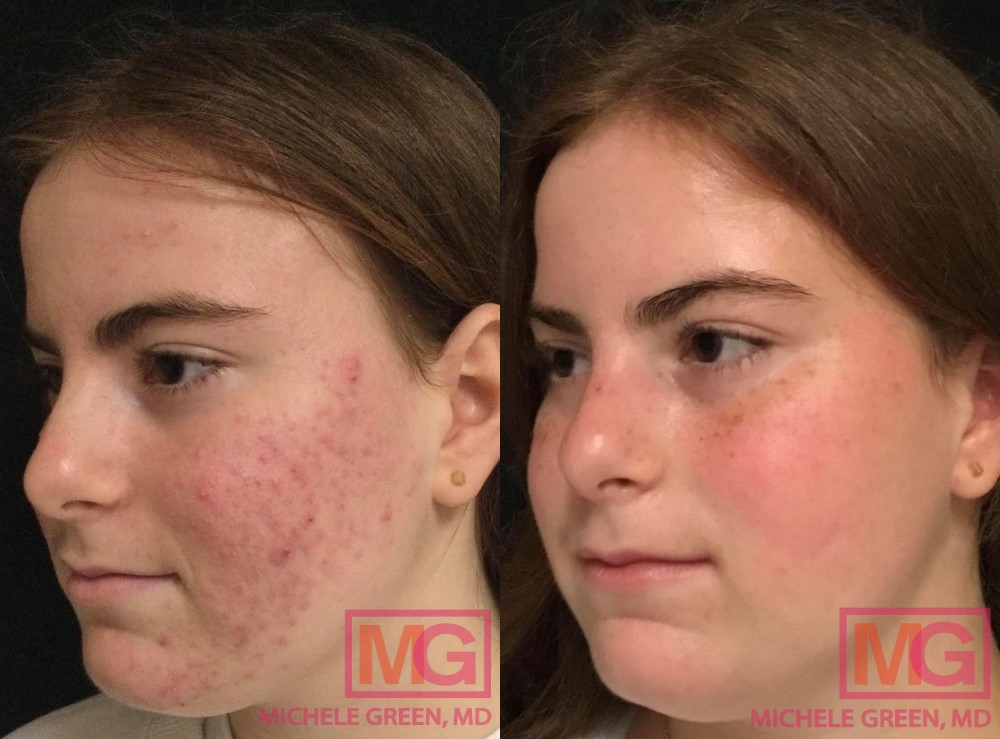
Are Accutane effects permanent?
Accutane is the most effective treatment for removing stubborn, severe, and persistent acne breakouts, and it is the closest treatment available to a cure for acne. After a 20-week course, 95% of patients will experience a complete reduction in acne nodules in the treated area. For the remaining 5%, most will need to continue treatment for an additional 16-20 weeks. However, it’s essential to follow the proper Accutane dosage to prevent breakouts after treatment. The recommended dosage for Accutane is 1 to 2 milligrams per kilogram of body weight daily. When patients receive a dose that is too low or subtherapeutic, there’s a higher risk of acne returning after the course ends. Studies also show that younger patients are more likely to relapse compared to older patients. If acne comes back, patients can see their healthcare provider for another round of Accutane.
Is Accutane safe?
Accutane is a generally safe treatment for most patients. However, it is unsafe for pregnant or breastfeeding women, as it can cause serious birth defects and developmental issues in babies. Because of this, the FDA requires women who can get pregnant to take a monthly pregnancy test while using Accutane. The medication should also be avoided by patients taking certain drugs, such as tetracycline antibiotics, doxycycline, minocycline, and phenytoin, due to potential dangerous interactions. Additionally, alcohol consumption should be avoided during treatment. Studies show that Accutane is completely safe at full dosage for patients with conditions like Crohn’s disease, diabetes mellitus, epilepsy, spina bifida, and ulcerative colitis. Patients with conditions such as chronic renal failure, those undergoing renal dialysis, immunosuppression, manic depressive psychosis, motor neuron disease, and multiple sclerosis are unlikely to experience adverse effects related to their condition from Accutane. For more information, visit www.fda.gov.
Because Accutane is a complex medication with many side effects, it should not be taken without the medical advice of a board-certified physician like Dr. Michele Green in NYC. An experienced dermatologist must carefully monitor you for potential adverse effects and determine the correct dosage to prevent serious health issues. During your initial consultation with Dr. Green, be sure to disclose any relevant medical history to confirm you’re a good candidate for Accutane treatment.
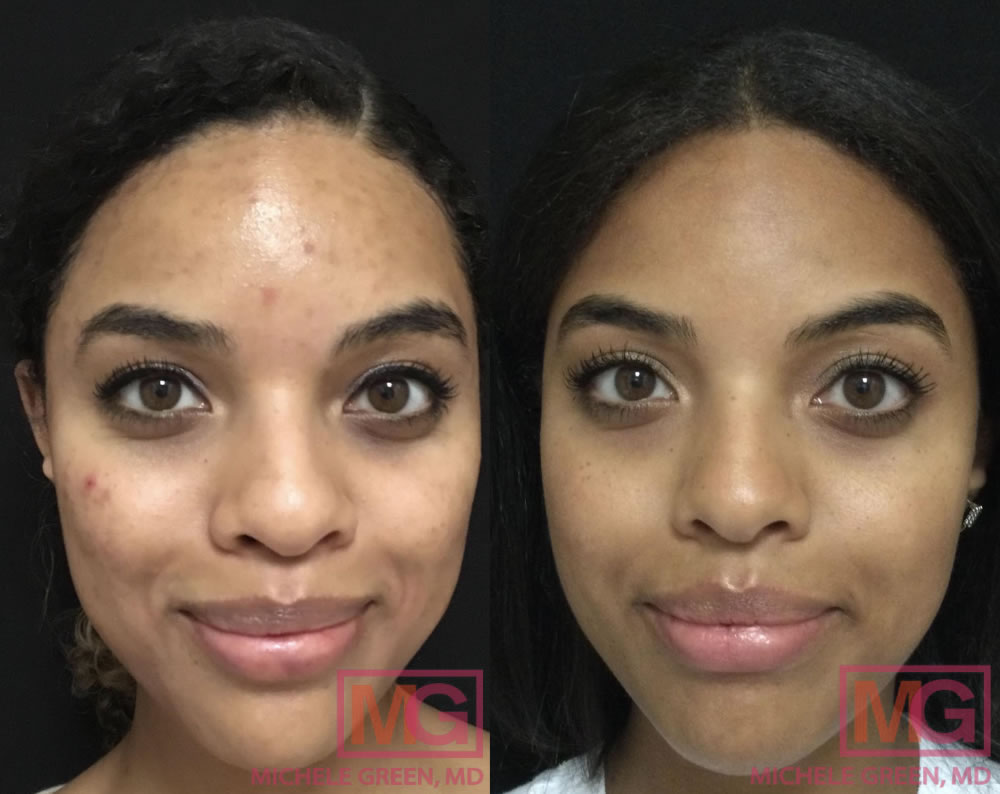
32 year old treated with Accutane – 6 months
Frequently Asked Questions (FAQs) about Accutane:
How long has Accutane been used for acne?
Isotretinoin was recognized as an effective treatment for severe acne in the 1970s. The U.S. Food and Drug Administration approved Accutane in 1982 for treating severe, resistant nodular acne that does not respond to standard therapies. Although Roche discontinued the brand name Accutane in 2009 due to declining market share, other generic versions of Isotretinoin, such as Claravis, Absorica, Amnesteem, Myorisan, Zenatane, and Sotret, are still commonly prescribed today, showing that Isotretinoin has been used to treat acne for over 43 years.
Was Accutane taken off the market?
In 2009, Roche Pharmaceuticals, the original producer of brand-name Accutane, discontinued the product when its patent expired due to several reasons, including the availability of many cheaper generic medications and the costs associated with defending personal injury lawsuits filed by some users. Isotretinoin, the generic name, is available by prescription from a doctor and is also sold under other brand names such as Absorica, Amnesteem, Claravis, Myorisan, and Zenatane in the United States. Although Accutane is no longer on the market, the treatment is still commonly called the Accutane regimen.
What brands of Isotretinoin are currently available?
While Isotretinoin is often called Accutane, the brand name Accutane is no longer available in the United States. As of 2017, the available brand names for Isotretinoin in the U.S. include Zoretanin, Absorica, Amnesteem, Claravis, Myorisan, Sotret, and Zenatane. Isotretinoin is an oral medication that can only be prescribed and monitored by a board-certified dermatologist, such as Dr. Green, who has been prescribing it for over twenty years and consistently achieves excellent results.
Are Acnetane and Accutane the same thing?
Accutane and Acnetane are both brand names for the medication isotretinoin. Accutane was the main brand used in the United States but was discontinued in 2009 due to increased competition and a decline in market share. Acnetane is another brand name for Isotretinoin, commonly used in South Africa. Both medications are used to treat severe acne; however, the original Accutane brand is no longer available, though many people still refer to Isotretinoin by this name.
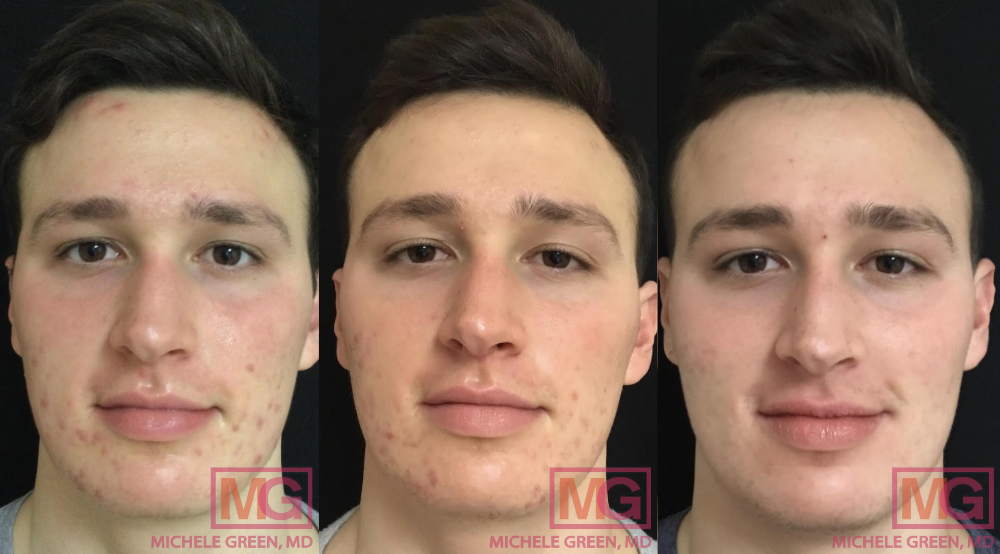
Should I take Accutane for moderate acne?
In the past, Accutane was only used for patients with severe cystic acne. Now, it is a common medication prescribed by dermatologists for many acne sufferers. Accutane might be recommended to those with moderate acne that remains stubborn and persistent despite other oral and topical treatments. To determine if you are a good candidate for Accutane, scheduling a consultation with a board-certified dermatologist, like Dr. Michele Green in NYC, can help you achieve clearer skin.
When does acne typically improve with Accutane?
Yes! Most patients notice an immediate improvement in their skin within the first month of taking Accutane. Over the next five months, the dose of their Accutane prescription is gradually increased to prevent new breakouts and ensure pimples do not return after completing the course. The maximum recommended dosage of Accutane is 2 milligrams per kilogram of body weight per day. Over 95% of patients respond well to Accutane as an acne treatment and experience no further breakouts after finishing their five-month course. Of the 5% of patients who do not have clear skin after five months of taking Isotretinoin, 50% become completely clear after a second course of Accutane. If a second course is necessary, it cannot be started until at least two months after finishing the first course.
Does Accutane cause more acne?
Accutane itself does not cause more acne. It treats acne by addressing the root problems: excess oil production, blocked pores, and inflammation. With this medication, oil levels are significantly reduced, and the shedding of dead skin cells is controlled. Even though Accutane doesn’t directly kill bacteria, the lower sebum production creates an environment that limits the growth of bacteria often linked to acne. Also, normalizing skin cell shedding stops them from clumping together and clogging pores. During treatment, both the acne and the overall appearance of the skin should improve.
Why am I still getting acne while on Accutane?
Acne occurs when follicles are blocked with dirt, sebum, or debris, leading to an inflammation in the skin. While Accutane is a very powerful and effective medication, it is not an instant cure and requires time to work. Shortly after beginning treatment, Accutane suppresses oil production, reduces the size of sebaceous glands, and kills bacteria that cause acne. As a result, you will notice your skin clearing up as the treatment progresses. If you are experiencing acne breakouts while on Accutane, your dermatologist may adjust the dose to a range between 1 mg and 2 mg per kg of body weight. Throughout your treatment, an experienced dermatologist, like Dr. Green, will carefully monitor you for side effects and adjust the dose as needed to prevent serious health problems and help you achieve clear skin. If you still experience breakouts after your 20-week course, Dr. Green may suggest an additional month of Accutane to help manage your acne.
Does Accutane keep acne away forever?
Accutane is the only permanent solution for eliminating moderate to severe acne or acne that doesn’t respond to other treatments. The oral medication takes about 20 weeks to clear breakouts on the face and body and to prevent the formation of acne scars. Most patients achieve complete clearance of their acne after one course of Accutane; however, patients who experience breakouts after finishing Accutane can take another short course to eliminate their acne for good.
Why am I getting acne after completing Accutane?
Acne can sometimes recur after completing treatment, even with strong and effective medication like Accutane. This recurrence may occur due to various factors, including personal predisposition, the severity of the original acne, the body’s response to the medication, and incorrect dosages. Studies have shown that a higher dose of Accutane reduces the risk of acne relapse. The recommended dose for Accutane patients should be at least 1mg/kg of body weight, but increasing it to as much as 2mg/kg can be more effective in clearing acne and preventing it from coming back. While an acne relapse can be frustrating, acne usually does not return to the same level as before treatment with Accutane. If you experience breakouts after finishing Accutane, talk to your dermatologist about additional topical treatments or a possible second course of Accutane.
How much does Accutane cost?
The cost of Accutane depends on your insurance coverage. Before starting Accutane, it is recommended to contact your health insurance provider to find out what is covered under your specific plan and whether there are any out-of-pocket costs involved.
Can you drink alcohol on Accutane?
It is not advisable to drink alcohol while on Accutane because the medication is processed in the liver. Consuming alcohol can increase your liver enzymes, which could potentially harm your liver. One possible side effect of drinking alcohol during Accutane treatment is liver damage. Monthly blood tests are used to monitor for side effects, including those impacting liver function.
Does Accutane make you tired?
Although it is not a common side effect, Accutane can cause fatigue. If you experience increased tiredness while taking Accutane, notify your provider, who can make any necessary adjustments to your prescription.
Does Accutane cause hair loss?
Hair thinning and hair loss are uncommon side effects that can occur in some individuals taking Accutane. These effects happen partly because Accutane reduces the size of sebaceous glands in the skin, which can cause dry, brittle hair more likely to break. However, deep conditioners and gentle shampoos can help minimize this type of hair breakage. Hair loss from Accutane is usually temporary and should fully recover after completing the treatment. If your hair takes longer to grow back after finishing your Accutane course, inform Dr. Green. Topical treatments like minoxidil (Rogaine), oral supplements such as Nutrafol, and procedures like Platelet-Rich Plasma (PRP) injections may help speed up hair regrowth. Dr. Green can evaluate your hair health and recommend the best treatment plan for you.
Does Accutane stunt growth?
Yes, it has been noted that Accutane can stunt growth by causing premature closure of the growth plates. Teenagers considering Accutane should be evaluated by their pediatrician to confirm they have finished growing before beginning treatment.
Can Accutane cause changes in weight?
No! Weight gain or weight loss is not a potential side effect of taking Accutane. Per the FDA, weight changes have not been linked to Accutane.
Can Accutane cause depression?
There have been reports of mental health side effects linked to Accutane, including depression and mood swings. However, clinical studies show that there is no direct connection between depression and Accutane. Often, acne leads to insecurity and depression, so many patients actually see mood improvements while on Accutane as their skin clears. If you have a history of depression or begin to experience depressive episodes while taking Accutane, it is important to discuss your medical history with Dr. Green.
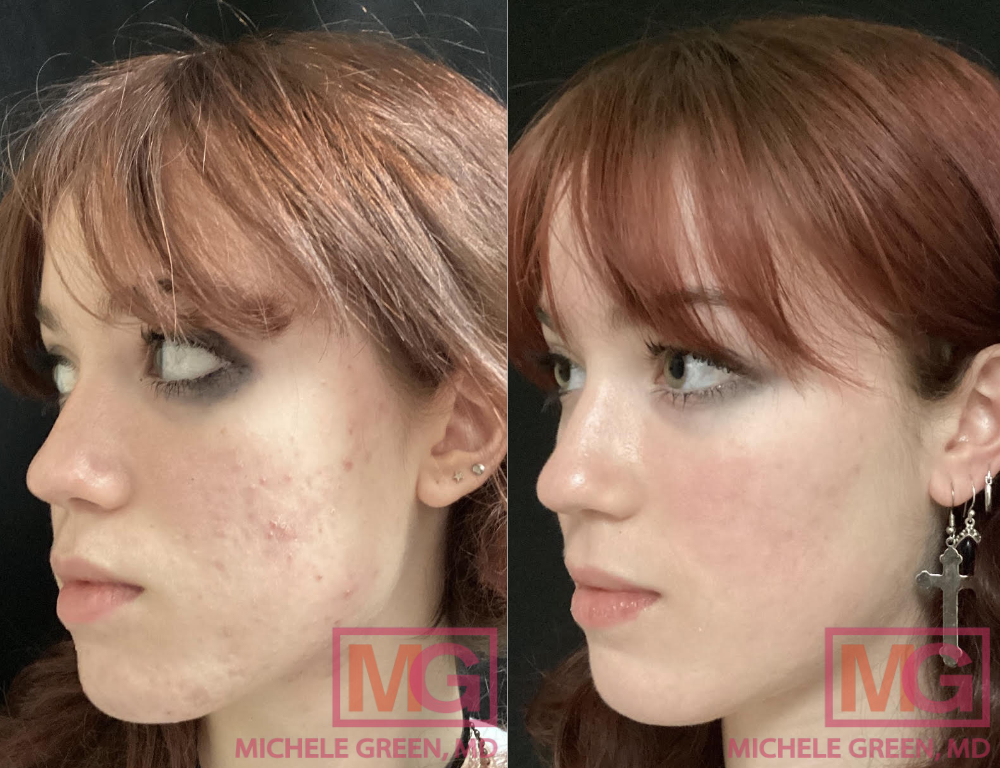
Does Accutane help with scars?
Yes! Acne scars develop due to inflammation linked to acne lesions, leading to permanent damage to the underlying skin tissue. The skin’s natural healing process relies on producing new collagen, which helps form a firm and smooth foundation. When collagen production is insufficient, atrophic acne scars form, characterized by depressions or indentations in the skin. Conversely, when too much collagen is produced, hypertrophic or keloid scars develop, marked by raised, growth-like scars. Cystic acne is especially likely to cause scars because it tends to be more inflamed than other types of acne. Accutane can help prevent the formation of acne scars by reducing inflammation in cystic acne breakouts. However, Accutane generally cannot significantly improve existing scars, which typically require treatment with various cosmetic procedures at Dr. Green’s private dermatology practice. Once your acne clears, Dr. Green will collaborate with you to create a personalized acne scar treatment plan.
Accutane treats active acne, helping to prevent scars from forming. Some of the most effective treatments for acne scars include chemical peels, dermal fillers, and laser resurfacing. However, while on Accutane, the only safe options for treating scars are the VBeam laser and dermal filler injections. The VBeam laser is a gentle procedure that reduces redness and can also help decrease acne breakouts. Dermal fillers like Restylane, Sculptra, and Juvederm are ideal for filling in depressions or atrophic scars to restore lost volume and create smoother, more youthful-looking skin. Patients should wait at least six months before undergoing chemical peels or laser treatments. During treatment and for several months afterward, procedures such as dermabrasion, exfoliation, plastic surgery, laser treatments, laser tattoo removal, laser hair removal, and waxing should be avoided.
Where can I get Accutane?
Accutane is not available over the counter, so patients need a prescription from a healthcare provider. The first step is to see a board-certified dermatologist, such as Dr. Green in NYC. During your appointment, you will discuss your skin condition and medical history, and she will determine if Accutane is the right treatment for you. Blood tests are required to monitor your liver enzymes and complete blood count. Women must have two negative pregnancy tests before starting Accutane. Additionally, women are required to use two forms of birth control or abstain from sexual intercourse while taking Accutane, as it can cause birth defects.
All patients must be registered with the iPLEDGE program to receive their prescriptions from the pharmacy. Dr. Green will give you an identification number to access the iPLEDGE system and fill your prescription. A follow-up appointment with Dr. Green is required once a month while taking Accutane so your progress can be monitored and your condition discussed, including any side effects you might be experiencing. During each monthly visit, blood tests are sent to the lab, including a pregnancy test if you are a woman capable of becoming pregnant.
Will I get acne again after Accutane?
A significant majority, about 95%, of patients achieve and maintain clear skin after their first course of Accutane. A small number of patients might experience acne breakouts again, which can be caused by factors such as the severity of the acne and genetic predisposition. Responses to Accutane vary from person to person. If you’re experiencing a relapse, it’s important to talk to your dermatologist about possibly taking a second course.
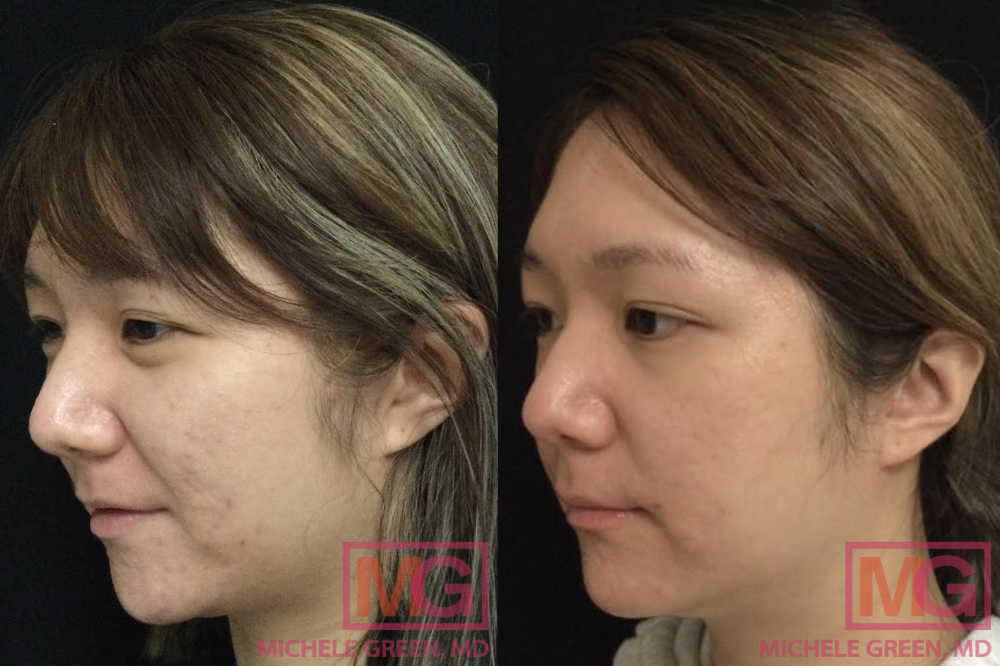
Is Accutane worth it?
Yes! Most patients who have taken Accutane only regret one thing: not starting it sooner! Dealing with acne can be exhausting, trying numerous over-the-counter products, topical treatments, and oral antibiotics prescribed by a doctor with little success. Acne can, for many, lead to self-esteem issues and even depression. It is estimated that one in every five people with acne will develop scars, which can be even more difficult to treat than the breakouts themselves. Therefore, starting Accutane as early as possible is highly recommended to treat breakouts and reduce the risk of permanent scars effectively.
How do I get started with Accutane for acne treatment today?
Acne is one of the most common skin conditions seen in people, with the American Academy of Dermatology reporting that over 50 million Americans are affected each year. Although common, active breakouts and the scars they may leave behind can, for many, lead to feelings of self-consciousness and low self-esteem. Fortunately, Accutane is a highly effective treatment that has helped many people permanently clear their breakouts and attain smooth, healthy skin in as little as 20 weeks. While Isotretinoin was once reserved for severe cystic acne, it is now recommended as a safe and effective option for all types of breakouts. If you’re dealing with persistent breakouts, schedule a consultation with Dr. Green to see if Accutane is right for you.
Dr. Green is an internationally renowned dermatologist with over 25 years of experience helping patients worldwide, including offering Accutane for acne treatment. Recognized by Castle Connolly, Super Doctors, The New York Times, and New York Magazine, she is consistently rated as one of New York City’s top dermatologists for her dedication and expertise. Dr. Green adopts a holistic approach, tailoring each treatment plan with a blend of in-office procedures, specially formulated skincare products, and necessary prescription medications to address individual skin concerns and meet aesthetic goals. To schedule a consultation with Dr. Green and begin your personalized acne treatment with isotretinoin capsules, call the NYC office at 212-535-3088 or contact us online today.
 212-535-3088
212-535-3088